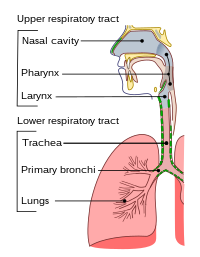
Photo from wikipedia
Background and Objectives: The concentration of antibodies against virus influenza A H1N1 in the titer (≥1:32) positively correlates with resistance to flu in healthy persons. In elderly and immune-compromised patients,… Click to show full abstract
Background and Objectives: The concentration of antibodies against virus influenza A H1N1 in the titer (≥1:32) positively correlates with resistance to flu in healthy persons. In elderly and immune-compromised patients, an influenza vaccine may be less immunogenic. Hypothesis: A lower post-vaccinal antibody titer (≥1:16) may be sero-protective against respiratory viral infections in patients with autoimmune rheumatic diseases. Materials and Methods: Fifty patients with autoimmune rheumatic diseases (Systemic Lupus Erythematosus—24; Rheumatoid Arthritis—15; and Sjögren’s Syndrome—11), who were at least 65 years old or whose relative disease duration (disease duration/age) was greater than 1/8, were examined. Thirty-four of them were vaccinated with a trivalent inactivated non-adjuvant influenza vaccine. The antibody concentration against influenza virus A H1N1 was measured using the standardized hemagglutination inhibition test and patients who got any respiratory viral infection were registered. To test the hypothesis, a correlative analysis was applied, followed by a binary logistic regression that included potential confounding variables, such as age, disease duration and therapy (personal/health-related conditions). Results: Vaccinated patients were significantly less affected by respiratory viral infections (21% vs. 75%). The lower titer considered (≥1:16) was significantly present more often among vaccinated patients (68% vs. 6%). The correlation between its presence/absence and that of respiratory viral infections was –0.34 (p < 0.05). The binary logistic regression evidenced the relevance of this correlation, confirming the hypothesis. Vaccination was associated with the 87.3% reduction in the likelihood of getting respiratory viral infections, whereas the lower antibody titer (≥1:16) was associated with the 77.6% reduction in the likelihood of getting respiratory viral infections. The vaccine was well tolerated by all patients and after vaccination no exacerbation of the underlying disease was observed. Conclusions: A lower antibody titer (≥1:16) against influenza virus A H1N1 could be protective against respiratory viral infections for certain autoimmune rheumatic diseases patients, which confirms the clinical effectiveness of influenza vaccination.
Journal Title: Medicina
Year Published: 2022
Link to full text (if available)
Share on Social Media: Sign Up to like & get
recommendations!